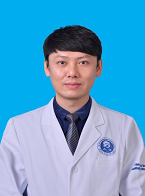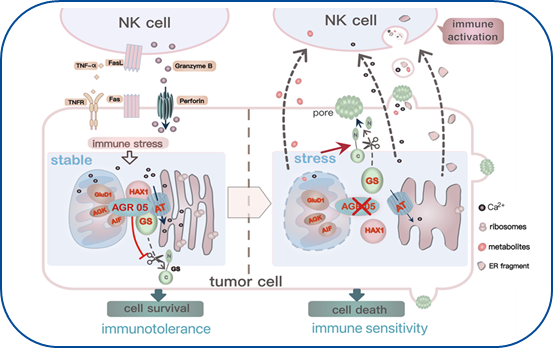
|
Professor Yufeng Wang
Cancer Institute of Jilin University
The First Hospital of Jilin University
519Dongminzhu Street, Changchun, Jilin, 130000, China
Tel +86 13504391166
E-mail:yufeng_wang@jlu.edu.cn
Website:https://www.jdyy.cn/index.php?m=home&c=View&a=index&aid=2872
Research Area: Cancer immunology, oncology, cancer immunotherapy
Specialties: NK cell biology, tumor immune escaping, chimeric antigen receptor (CAR) T cell or NK cell therapy |
Biography
Yufeng Wang, Ph.D., is a professor of the Cancer Research Institute of Jilin University in the First Hospital of Jilin University.Dr. Wang received his Ph.D. degree from Yamaguchi University in Japan in 2014 and then move to the Ohio State University for his postdoctoral training. In 2019, Dr. Wang joined the First Hospital of Jilin University and has received 2 fundings from National Natural Science Foundation of China, include The National Science Fund for Distinguished Young Scholars and the General Program.
Dr. Wang’s research interests include cancer immunology, nature killer cell biology, chimeric antigen receptor T cells and NK cells. His lab focuses on both basic and translational research relevant to developing innovative immunotherapy for the treatment of cancers. Dr. Wang has authored over 33 SCI publications, many of the which are in high-impact journals, in the field of nature killer cell biology, cancer immunotherapy, etc. Such as Nature Immunology, Cancer Discovery, JCI, Nature Communications, Clinical Cancer Research and Plos Biology. His works firstly explored 1) the immunoregulationmechanism of IL-15 – AKT – XBP1s signal pathway, 2) anti-PD-L1 monoclonal antibody effect on PD-L1+ NK cells against PD-L1- human leukemia,3) the critical function of NKp46 of the innate lymhoid cell 1 development and 4) the NK-cell depletion effect of Daratumumab during the therapy for multiple myeloma.
Education
2014 Ph.D., Department of Biochemistry and Functional Proteomics, Yamaguchi University
2009 B.S., Laboratory Medicine, Beihua University
Positions
2019- Professor,Cancer Institute of Jilin University, The First Hospital of Jilin University
2015-2018 Postdoctoral Fellow, Department of Hematology, The Ohio State University
Professional Membership
Jilin Society for Cell Biology
China Medicinal Biotech Association
Awards/Honors
2021 Jilin Province Changbaishan Extraterritorial Leading Talent
2020 The National Science Fund for Excellent Young Scholars
2020 Jilin Province talent "18 points" policy ministerial leading talents
2020 “Tang Aoqing” Scholar Leading Professor of Jilin University
Research Interest
NK cell biology, tumor immune escaping, chimeric antigen receptor (CAR) T cell or NK cell therapy

Selected Publications
Authored around 34 papers in international journals, including Nature Immunology, Cancer Discovery, JCI, Nature Communications, Clinical Cancer Research and Plos Biology. First authored 16 papers.
1. The IL-15-AKT-XBP1s signaling pathway contributes to effector functions and survival in human NK cells.
Wang Y, Zhang Y, Yi P, Dong W, Nalin AP, Zhang J, Zhu Z, Chen L, Benson DM, Mundy-Bosse BL, Freud AG, Caligiuri MA, Yu J. Nat Immunol. 2019 Jan;20(1):10-17. doi: 10.1038/s41590-018-0265-1. Epub 2018 Dec 10
2. The Mechanism of Anti-PD-L1 Antibody Efficacy against PD-L1-Negative Tumors Identifies NK Cells Expressing PD-L1 as a Cytolytic Effector.
Dong W, Wu X, Ma S, Wang Y, Nalin AP, Zhu Z, Zhang J, Benson DM, He K, Caligiuri MA, Yu J. Cancer Discov. 2019 Oct;9(10):1422-1437. doi: 10.1158/2159-8290.CD-18-1259. Epub 2019 Jul 24
3. Dependence of innate lymphoid cell 1 development on NKp46.
Wang Y, Dong W, Zhang Y, Caligiuri MA, Yu J.PLoS Biol. 2018 Apr 27;16(4):e2004867. doi: 10.1371/journal.pbio.2004867
4. Fratricide of NK Cells in Daratumumab Therapy for Multiple Myeloma Overcome by Ex Vivo-Expanded Autologous NK Cells.
Wang Y, Zhang Y, Hughes T, Zhang J, Caligiuri MA, Benson DM, Yu J. Clin Cancer Res. 2018 Aug 15;24(16):4006-4017. doi: 10.1158/1078-0432.CCR-17-3117. Epub 2018 Apr 17
5. Non-CoatedRituximab Induces Highly Cytotoxic Natural Killer Cells From Peripheral Blood Mononuclear Cells via Autologous B Cells.
Niu C, Chen Y, Li M, Zhu S, Zhou L, Xu D, Li Z, Xu J, Li W, Wang Y, Cui J. Front Immunol. 2021 May 25;12:658562. doi: 10.3389/fimmu.2021.658562
6. CGK733-induced LC3 II formation is positively associated with the expression of cyclin-dependent kinase inhibitor p21Waf1/Cip1 through modulation of the AMPK and PERK/CHOP signaling pathways.
Wang Y, Kuramitsu Y, Baron B, Kitagawa T, Tokuda K, Akada J, Nakamura K. Oncotarget. 2015 Nov 24;6(37):39692-701. doi: 10.18632/oncotarget.5625
7. Cofilin-phosphatase slingshot-1L (SSH1L) is over-expressed in pancreatic cancer (PC) and contributes to tumor cell migration.
Wang Y, Kuramitsu Y, Kitagawa T, Baron B, Yoshino S, Maehara S, Maehara Y, Oka M, Nakamura K.CancerLett. 2015 May 1;360(2):171-6. doi: 10.1016/j.canlet.2015.02.015. Epub 2015 Feb 12
8. Gemcitabine induces poly (ADP-ribose) polymerase-1 (PARP-1) degradation through autophagy in pancreatic cancer.
Wang Y, Kuramitsu Y, Tokuda K, Baron B, Kitagawa T, Akada J, Maehara S, Maehara Y, Nakamura K. PLoS One. 2014 Oct 1;9(10):e109076. doi: 10.1371/journal.pone.0109076
9. Glyoxalase I (GLO1) is up-regulated in pancreatic cancerous tissues compared with related non-cancerous tissues.
Wang Y, Kuramitsu Y, Ueno T, Suzuki N, Yoshino S, Iizuka N, Akada J, Kitagawa T, Oka M, Nakamura K.Anticancer Res. 2012 Aug;32(8):3219-22
10. Identification of four isoforms of aldolase B down-regulated in hepatocellular carcinoma tissues by means of two-dimensional Western blotting.
Wang Y, Kuramitsu Y, Takashima M, Yokoyama Y, Iizuka N, Tamesa T, Sakaida I, Oka M, Nakamura K. InVivo. 2011 Nov-Dec;25(6):881-6
11. PERK/CHOP contributes to the CGK733-induced vesicular calcium sequestration which is accompanied by non-apoptotic cell death.
Wang Y, Kuramitsu Y, Baron B, Kitagawa T, Akada J, Tokuda K, Cui D, Nakamura K. Oncotarget. 2015 Sep 22;6(28):25252-65. doi: 10.18632/oncotarget.4487
12. PI3K inhibitor LY294002, as opposed to wortmannin, enhances AKT phosphorylation in gemcitabine-resistant pancreatic cancer cells.
Wang Y, Kuramitsu Y, Baron B, Kitagawa T, Tokuda K, Akada J, Maehara SI, Maehara Y, Nakamura K.Int J Oncol. 2017 Feb;50(2):606-612. doi: 10.3892/ijo.2016.3804. Epub 2016 Dec 14
13. Proteomic analysis indicates that overexpression and nuclear translocation of lactoylglutathione lyase (GLO1) is associated with tumor progression in murine fibrosarcoma.
Wang Y, Kuramitsu Y, Tokuda K, Okada F, Baron B, Akada J, Kitagawa T, Nakamura K. Electrophoresis. 2014 Aug;35(15):2195-202. doi: 10.1002/elps.201300497. Epub 2014 Mar 20
14. Differential expression of up-regulated cofilin-1 and down-regulated cofilin-2 characteristic of pancreatic cancer tissues.
Wang Y, Kuramitsu Y, Ueno T, Suzuki N, Yoshino S, Iizuka N, Zhang X, Oka M, Nakamura K.Oncol Rep. 2011 Dec;26(6):1595-9. doi: 10.3892/or.2011.1447. Epub 2011 Sep 5
15. Proteomic differential display identifies upregulated vinculin as a possible biomarker of pancreatic cancer.
Wang Y, Kuramitsu Y, Ueno T, Suzuki N, Yoshino S, Iizuka N, Zhang X, Akada J, Oka M, Nakamura K. Oncol Rep. 2012 Nov;28(5):1845-50. doi: 10.3892/or.2012.2004. Epub 2012 Aug 30
16. Screening for serological biomarkers of pancreatic cancer by two-dimensional electrophoresis and liquid chromatography-tandem mass spectrometry.
Wang Y, Kuramitsu Y, Yoshino S, Takashima M, Zhang X, Ueno T, Suzuki N, Oka M, Nakamura K.Oncol Rep. 2011 Jul;26(1):287-92. doi: 10.3892/or.2011.1278. Epub 2011 Apr 21
17. The Histone Deacetylase Inhibitor Valproic Acid Sensitizes Gemcitabine-Induced Cytotoxicity in Gemcitabine-Resistant Pancreatic Cancer Cells Possibly Through Inhibition of the DNA Repair Protein Gamma-H2AX.
Wang Y, Kuramitsu Y, Kitagawa T, Tokuda K, Baron B, Akada J, Nakamura K. Target Oncol. 2015 Dec;10(4):575-81. doi: 10.1007/s11523-015-0370-0
Projects
2021.12-2026.06 Research of generationimmune cells from pluripotent stem cells (PSC),National Natural Science Foundation of China, Major Program, subproject; 0.8 million (RMB)
2020.01-2023.12 Research of the mechanisms of XBP1s regulation of activity and survival of NK cells throughIKKs-NF-kappaB pathways,National Natural Science Foundation of China, GeneralProgram; 0.55 million (RMB)
2020.01-2022.12 NK cell therapy for cancer, National Science Fund for Excellent Young Scholars,1.2million (RMB)
 Home /
Team Members
/
Content
Home /
Team Members
/
Content